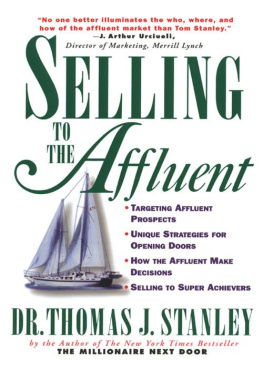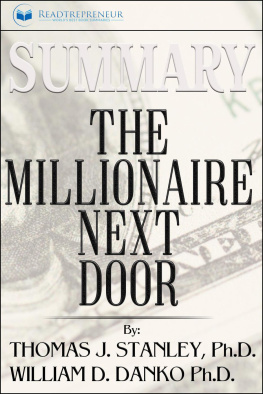Appendix 1.
Content Analysis of 313 Essays Written by
Women Who Own and Operate Successful Businesses
Appendix 2.
The Profitability of Small Business: Net Income
Appendix 3.
The Profitability of Small Business: Return on Receipts
Appendix 4.
The Profitability of Small Business:
The Proportion of Profitable Businesses
Appendix 5.
The Profitability of Small Business:
Net Income for Businesses with Net Income
Appendix 6.
The Profitability of Small Business:
Return on Receipts for Businesses with Net Income
Acknowledgments

I am indebted to my wife, Janet, for her guidance, patience, and assistance in helping select concepts and case studies and for her special talent in shaping this manuscript.
I also acknowledge the superb contribution of my children. Dr. Sarah S. Fallaw provided much food for thought regarding life as well as job-related satisfaction measures and concepts. Brad Stanleys inputs about topic selection were invaluable. He also won the What Title? contest.
Once again, the Survey Research Center, Institute for Behavioral Research, University of Georgia, did an outstanding job collecting and tabulating the survey data for this book. Special thanks are accorded to Dr. James J. Bason, director of the Survey Research Center; Kathleen J. Shinholser, key statistician and number cruncher; Linda J. White; Zelda R. McDowell; Mary Ann Mauney; and Cindy Burroughs.
Acknowledged is the extraordinary effort and brilliant work carried out by Heather Breedlove, CPA, and Teresa Miller, CPA, JD, in crunching numbers.
I am most appreciative and grateful to Frank Provin Bulloch and his colleagues at the Edwards Institute for Social Research for designing and developing the content analysis of the factors that account for success.
John Connerat and Tim Fallaw of Connerat and Fallaw did an outstanding job in enhancing the quality control system for this project.
And again, a million thank-yous to Bill Marianes of Troutman Sanders, Atlanta, for his great empathy and expertise in representing me.
I owe a deep debt of gratitude to my editor, Chris Schillig, for her sage editorial comments and superb efforts in molding this manuscript.
Many, many thank-yous are accorded to Tom Thornton, president of Andrews McMeel Publishing, for his continued interest in and support of my work.
Special thanks go out to Teddy Scoop Graham, Sharon Weaver, and Kerry Spivey for their help in editing and word processing.
I.

WOMEN IN
BUSINESS
C HAPTER 1

An Introduction to
Millionaire Women Next Door
Women! Women in business business owners disastrous. Dangerous for you to excite these people. Women [as self-employed business owners] have no place in business. Personal experience irresponsible for you to glorify these women. The few who succeed are anomalies. You had better pick another topic. They are only wed to their businesses. Unmarried. Unkind. Uncaring. Tyrannical misers. Uncontrollable. Unliked. Undesirable. Unattractive. Unwanted. A bunch of angry, revenge-seeking workaholics. Women no business being in business!
T he fellow who uttered these words intercepted me shortly after I made a presentation about the contents of this book. I refer to him here as Mr. A. Lota-Uns or Al, for short. As he spoke, I noticed that his face became red while veins bulged from his neck and temples. Apparently, the content of my presentation angered him.
While Al was lecturing me, I asked myself how it was possible that everything he had personally experienced regarding women in business was at odds with the empirical data I had collected, which serves as the basis for this book.self-made businesswomen achieve their wealth? Not one of the women studied mentioned motivations of anger, revenge, resentment, or bitterness. Many discussed forgiving those who had harmed them and forgetting the past. Most receive considerable satisfaction from helping others. They are living proof that accumulating wealth and providing financial assistance to others are not mutually exclusive.
Why did these women provide so much detailed and candid information for this book? Note that not one of them asked that their real names be used. Most participated because they wanted to share their insights, not for glory. They did it to help others who wish to become independent. Of course, the benefit of responding anonymously may have also encouraged many of these women to be very frank about their journeys to success.
It did not concern me that Als beliefs were at odds with my own findings. But what if young, impressionable women are indoctrinated into believing such things? What if they are taught that women who succeed in business are destined to become the miserable people Al described? These young women will be very reluctant to venture into the world of the self-employed. Imagine what its like to be the daughter of an Al or others like him. What chance will these women have to succeed on their own in the economic arena?
Most of the women profiled herein report that their parents had a different mind-set than the Als of this world. When asked about their family life growing up, they revealed that their parents encouraged them to take the initiative, to seek out leadership roles. These parents also taught their daughters to have empathy for the needs of others, and they had the utmost respect for their children. Successful women whose parents provided them with such a nurturing environment (Alpha women) outnumber the other type (Beta women) by a ratio of nearly four to one. This is detailed in chapter 4, The Parents of Successful Businesswomen; chapter 5, Beta Women: Beating the Odds Against Succeeding; and chapter 6, Alpha Women vs. Beta Women.
Two of Als derogatory adjectives were of particular interest to me: unkind and uncaring. High-income-producing women, particularly those who are business owners, give significantly more money to noble causes than do their male counterparts (see chapter 3). Their high propensity for giving generously to charitable organizations is not only confirmed by my own survey but also well documented in the Internal Revenue Services data. Furthermore, it is not the only form of kindness where women outpace men. Self-made millionaire women who are business owners give more than three times the percentage of their incomes to their relatives than do men (see chapter 9).











